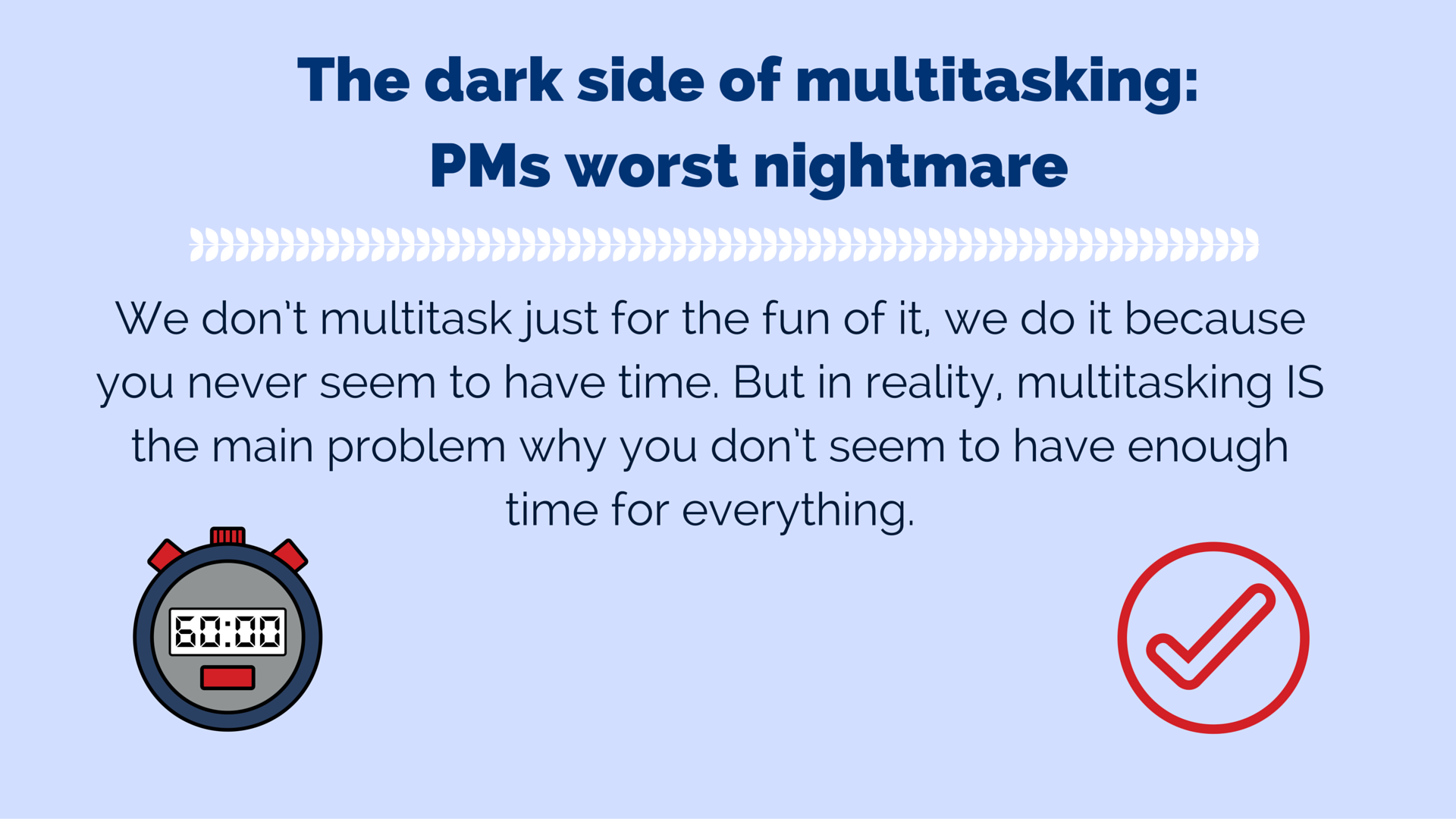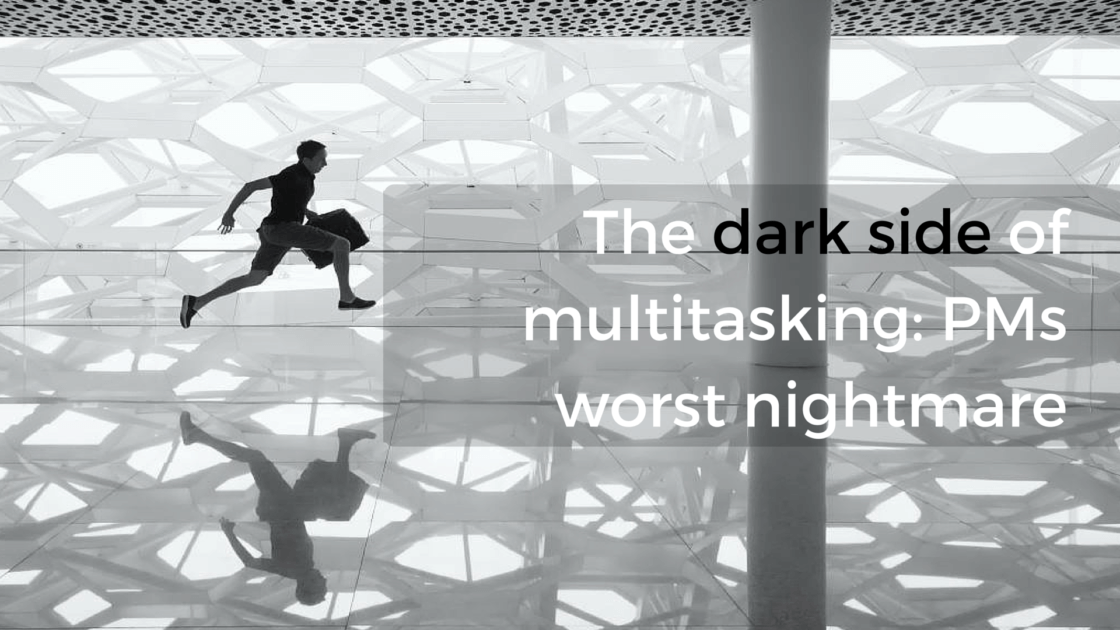“Multitasking is a part of my everyday life” – Monica Denise Brown
Bullshit.
If you read this quote and think that you have a lot in common with Ms. Brown, then you are in trouble. A whole lot of trouble.
The illusion of having what seems like a “must have” ability of doing several things at once is probably the main reason behind all your failed projects.
If you don’t believe me, that’s fine. There is a lot of research, studies and experiments performed by the world’s top professors and doctors. Read about their work.
Our brain may have infinite capabilities in terms of memory and creativity, but there are a certain number of things that it can focus on effectively at the same time – One.
Think of the last time you have managed to do two things simultaneously while preserving high quality and taking the least amount of time to do it and mention it in the comments. If you can do that, then I’ll refer to you as a jedi master.
The nightmare is our reality
The truth is, what people perceive as multitasking is actually switching tasks from time to time, which results in not being able to dedicate your full attention and mental capacity to both of the tasks. This basically means that instead of speeding things up you do the exact opposite – slow yourself down, while also maximizing your error chances and forgetting little details when performing tasks.
I will give you a good example, one that anybody can relate to and results in disasters every day. Talking on the phone/texting while driving.
Pretty common, everyday multitasking that happens to almost everybody. Well guess what, Cell phones while on the road kill 2600 and injure over 300.000 people every year. And that’s only United States. It’s impossible to concentrate on the road if you are also listening to another person on the other end of the line.
Shifting attention becomes a lot more difficult and your reflexes suffer. Moreover, because you are constantly switching tasks, it takes a lot more time for your brain to recognize potential threats and react properly.
This isn’t just an opinion. It’s science. It’s how our brains work. They were not made for multitasking and yet people keep abusing it, thinking it will help them get more done in the same amount of time. But in reality, they are only making it worse and ending up leaving the tasks in a mess, forgetting details, getting stressed from all of this and damaging their mental abilities. It’s like a disease that you don’t know about, which keeps getting stronger the more you practice multitasking and drawing you closer to project failures.

You think time is the issue?
Let’s face it. We don’t multitask just for the fun of it, we do it because you never seem to have time. But in reality, multitasking IS the main problem why you don’t seem to have enough time for everything. As a project manager, you have a lot of stuff to do. Too much stuff most of the times. When the deadlines are nearing and threaten to explode soon, you go for what you think is the logical solution – doing two or more things simultaneously – and that is where you really start having trouble.
This is where planning can come to help. If you can master planning and estimation, there will never be a need to multitask because you lack time. You have planned everything beforehand and distributed all the tasks accordingly. If you still lack time, you should focus on improving your planning techniques, not chasing illusions that will do nothing but harm.
Planning is the first step
Correct planning is the first step to eliminating multitasking. Make sure you get that right: not minimizing, but eliminating. You can still eat and drink at the same time if you like (although it still harms your digesting, but we are humans, we need to mess up every once a while, I understand that), but if you want to improve productivity, increase the number of successful projects and advance in your career, stop multitasking. Today.
If you are wondering how and where to start, I can help with that. I always look for those solutions, which seem to be a bad thing at a first glance, but can be turned into a powerful weapon when used correctly.
You have probably heard of how hard it is to quit smoking, even you aren’t a smoker yourself. Most smokers try to do it, but only a fraction succeeds. Why is it so hard though? Sure, the nicotine makes you addicted, but that can be dealt with.
There is another thing, which keeps smokers light cigarette after cigarette and it’s a very simple thing – habit.
Most people smoke more out of habit than out of the need for nicotine. This is exactly what you need. You need to force yourself to do one thing at a time and never get to the next task until you are done with the one at hand for the day. This doesn’t mean you need to turn your life into a “waterfall” – you can still do different tasks in the same day and not finish them, but make sure you aren’t going to get back to it in just a few minutes.
Practice this until doing one thing at a time becomes a habit. It’s damn hard to quit habits. Think about it. Each one of you has a certain habit that he or she does during the day or the week, just because you are used to do it.
Just like you have been taught to brush your teeth in the mornings and evenings as a child, or wash your hands before you eat, focusing on one thing at a time can be turned into a habit, that will be hard to quit and which, unlike most others, will help you succeed.
If I can do it, you can do it
I was a multitasker once. I thought I was pretty good at it and the illusion of having the ability to outperform others and finish my university exams sooner than anybody else by jumping from problem to problem gave me a feeling of self-satisfaction.
And yet, I wasn’t top of my class. Not even near. Do you know who was at the top? That’s right, the guys who took a bit longer, and focused on each problem individually and finished last. They still made it to the deadline, only they did a much better job by paying attention to details and double-checking their work.
That’s just how it works.
Follow us


